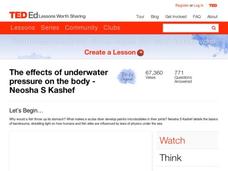Bozeman Science
Ideal Gas Law
In this video Paul Andersen explains how the pressure, volume, amount, and temperature of an ideal gas are related. Absolute zero of a gas can be determined by varying the temperature and measuring the corresponding volume of a gas...
Crash Course
Temperature: Crash Course Physics
Bridges. Bridges don't deal well with temperature changes. In order to combat this, engineers have come up with some work arounds that allow bridges to flex as they expand or contract. In this episode of Crash Course Physics, Shini talks...
TED-Ed
TED-Ed: The ABC's of gas: Avogadro, Boyle, Charles - Brian Bennett
How can bottles and balloons help explain the different laws that govern gas? See how Boyle's Law, Charles' Law, and Avogadro's Law help us understand the laws that govern gas properties.
Next Animation Studio
Volcanic eruption in Alaska may have helped end the Roman Republic: study
According to new research, a powerful volcanic eruption in modern-day Alaska around 44 B.C. may have contributed to the Roman Republic’s downfall on the other side of the globe.
Mazz Media
America's Journey Through Slavery: Harriet Tubman and Her Escape to Freedom
Millions of enslaved African-American men, women and children lived in the United States less than 200 years ago. During that period of American history, many brave men and women attempted an escape to freedom. Harriet Tubman overcame...
Crash Course
Thermodynamics: Crash Course Physics
Have you ever heard of a Perpetual Motion Machine? More to the point, have you ever heard of why Perpetual Motion Machines are impossible? One of the reasons is because of the first law of thermodynamics! In this episode of Crash Course...
TED-Ed
TED-Ed: Eye vs. camera - Michael Mauser
Your eyes don’t always capture the world exactly as a video camera would. But the eyes are remarkably efficient organs, the result of hundreds of millions of years of coevolution with our brains. Michael Mauser outlines the similarities...
MinuteEarth
Why Exercise Is Hard
Because exercise isn't essential for short-term survival, we don't exercise enough, so we need to reincorporate purposeful physical activity into our lives.
SciShow
The Physics of Roller Coasters
Roller coasters give people the opportunity to experience physics in dramatic ways. In this episode of SciShow, we break down how physics work on roller coasters to give you the ride of your life!
SciShow
The Physics of Roller Coasters
Roller coasters give people the opportunity to experience physics in dramatic ways. In this episode of SciShow, we break down how physics work on roller coasters to give you the ride of your life!
TED Talks
TED: 9 myths about psychology, debunked | Ben Ambridge
How much of what you think about psychology is actually wrong? In this whistle-stop tour of disproved ideas, Ben Ambridge shares nine popular ideas about psychology that have been proven wrong -- and uncovers a few surprising truths...
Curated Video
Understanding Writing Prompts: Identifying Keywords and Writing Types
In this video, the teacher explains how to analyze a writing prompt and determine what kind of writing is required. Using keywords in the prompt, students learn to identify the subject, audience, purpose, and type of writing they need to...
Curated Video
Natures and Properties of Nuclear Radiations: Alpha, Beta, and Gamma Rays
The video is a lecture on the natures and properties of nuclear radiations. The speaker discusses the three types of ionizing radiation: alpha particles, beta particles, and gamma rays. They explain the ionizing and penetrating abilities...
Seeker
This 3D Quantum Gas Clock Could Redefine Time
Time may be a human construct but that hasn't stopped physicists from perfecting it. Read More: JILA’s 3-D Quantum Gas Atomic Clock Offers New Dimensions in Measurement...
Bozeman Science
Thermodynamics and P-V Diagrams
In this video Paul Andersen explains how the First Law of Thermodynamics applies to an ideal gas in a piston. A pressure-volume graph can be used to determine the type of thermodynamic process. Included is a discussion of and P-V diagram...
Curated Video
Opposite words in Spanish - Opuestos
Get ready to learn about Spanish opposite words such as Heavy and Light, Outside and Inside, Slow and Fast, and many others!
MinuteEarth
How We Learned That Water Isn't An Element
For thousands of years, water was thought to be an element. That is, until some of the greatest chemists in the world managed to crack it open.
Crash Course
Introduction to the Solar System: Crash Course Astronomy
In today's Crash Course Astronomy, Phil takes a look at the explosive history of our cosmic backyard. We explore how we went from a giant ball of gas to the system of planets and other celestial objects we have today. This episode is...
Crash Course
Temperature: Crash Course Physics #20
Temperature can be hard on outdoor structures. Learn how engineers consider thermal energy effects while constructing structures such as bridges. The video lesson also considers how heat affects gases by exploring the ideal gas laws....
TED-Ed
The Effects of Underwater Pressure on the Body
Exactly what causes the the pain you feel when diving to the deep end of a pool? Find out with this short video that explores the physical laws governing the behavior of gases and the ways they affect marine life...
Teacher's Pet
Properties of Gases
What makes gases so unique? Physical science sleuths uncover the facts about gases in a short video. The narrator compares gases to solids and liquids in terms of space between particles, compressibility, and reaction to temperature...
MinutePhysics
What is a Dimension? In 3D...and 2D...and 1D
How many dimensions are there? Latitude, longitude, and altitude are accepted dimensions, but what about time or another type of dimension? An engaging video describes how we theorize that we live in three dimensions and which laws of...
Physics Girl
How to Make a Cloud in Your Mouth
Could you make a cloud with only what you have on you right now? The video explains how to use only your mouth to create a cloud, no matter the temperature outside. It also discusses the physics principles allowing this to occur, various...









